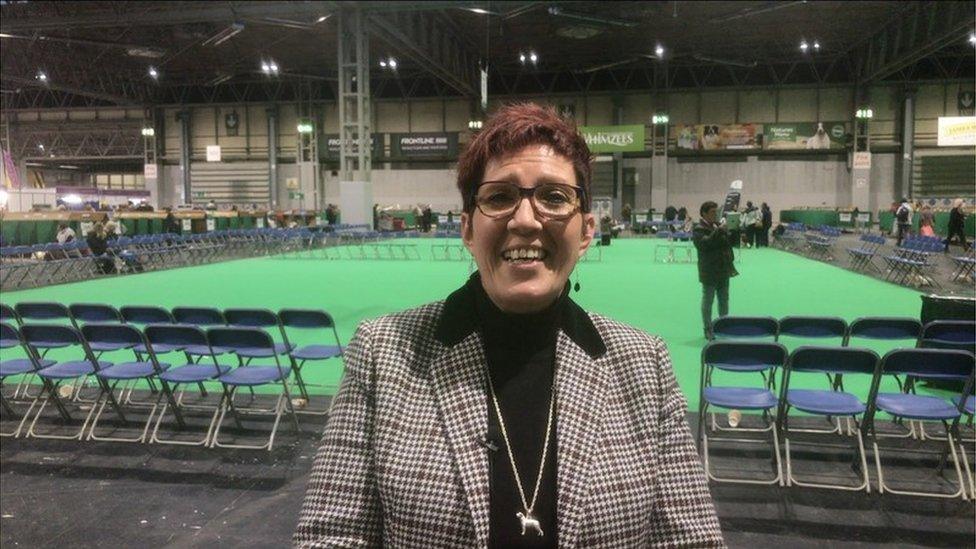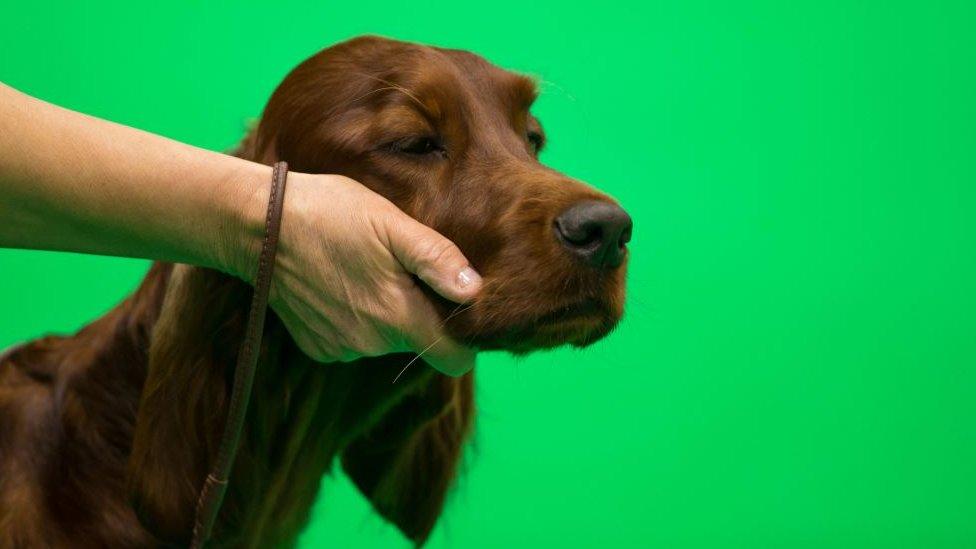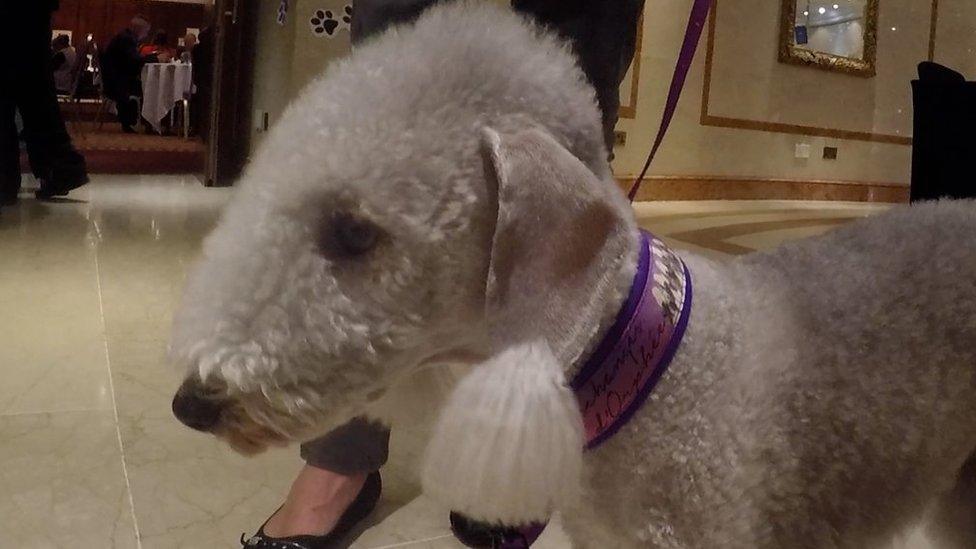Brexit: Crufts breeders at Birmingham show share EU exit fears
- Published
Crufts: How will the dog show be affected by Brexit?
The number of overseas dogs being entered at Crufts has dropped for the first time in almost a decade. Organiser the Kennel Club has suggested Brexit could be to blame. So what impact do breeders feel Brexit, particularly a no-deal exit from the EU, could have on the competition?
The annual four-day event at Birmingham's NEC, now in its 128th year, attracts thousands of visitors, breeders, traders and, of course, dogs.
However, for the first time in almost 10 years, the Kennel Club says overseas numbers have fallen - to 3,611 competing this year, compared with 3,623 in 2018.
This is Belgian Annick Provost's 29th Crufts, and she says she treats the event as a holiday.
She said she had noticed the drop in numbers.

Annick Provost said she treats her visits to Crufts as a holiday with her sister and friend
"It has scared people off and I feel for the future of breeding dogs, it [Brexit] is not a good idea," Ms Provost said.
"We will be separated like years ago and for breeders it is harder between the EU and UK because of further blood tests that are needed [if no deal is reached] and costs and waiting several months.
"You will have to plan so much more, so far ahead - the fun has gone."
Dogs have been able to travel to the show - and around the EU - without quarantine, using a passport under the Pet Travel Scheme since 2002.
Under the scheme, animals are required to have a valid rabies vaccination and microchip.
In the event of a no-deal scenario and the UK becoming an "unlisted country" further requirements would be introduced, external, which would include pet owners having to wait up to three months from a clear rabies blood test and getting a health certificate.
But for Anton Stoop, a Dutch clumber spaniel breeder, this is a reality he expects to happen. He said this, his 14th Crufts, will be his last.
Mr Stoop, who lives near Breda in the Netherlands , said he feared he would end up having to pay more for certificates and vet visits, which would add 200 to 300 euros (about £170-£260) on to any trip to the UK.
"Our biggest fear is that we are going to pay and do a lot of money and I think we are not going to do this.
"We love going to dog shows but it is costing us too much money - you are talking now about 1,000 euros for us to come for three or four days - so for us it's the end of Crufts for 2020."
Myranda Wielhouwer, who also lives near Breda, and brings clumber spaniels to Crufts, said she would not be returning.
"I am not coming over here again, this is the last for me," she said.
"My dogs are getting older and they are not going to qualify again but if they are going to be qualified and I have to do blood tests and so on it's too hard...
"We are welcome in the UK but the EU could bring in many restrictions which could make it hard to come back [home after being in the UK].
"There will be extra costs and it takes time and therefore you have to plan for it all more."

Thousands of dogs attend the annual event in Birmingham each year
Closer to home, giant schnauzer breeder Bob Marsh, from Wakefield, has another fear that may not be realised for some years to come.
Mr Marsh, who has been coming to Crufts for the past five years with Chewbacca, who is also a therapy dog for school children, said he feared for the gene pool breeders in the UK rely on.
"To improve the stock that we have, we have to import," he said.
"There are two ways to do that - artificial insemination is one way but not the favoured way, as we prefer the natural way and consequently we need to go abroad because you always travel to the stud to improve things.
"So [Brexit] may well make our life as breeders more difficult and subsequently over a longer time, it could shrink the genetic diversity that we have.
"Down the lines you'll have the same genes we have now, if we don't import new, which will impact health and temperament."

Bob Marsh and Chewbacca have been regulars at the event for the past five years
The UK is due to leave the European Union on 29 March regardless of whether there is a deal with the EU or not.
The government has said it is pressing for the UK to become a "listed" third country when it leaves which will avoid "burdensome" changes to requirements.
The Department for Environment, Food and Rural Affairs advised people to speak to their vets and read further guidance on its website.
A spokesman said: "The government is committed to achieving a deal with the EU. But in the event we do not reach an agreement, we have a duty as a responsible government to plan for every eventuality.
"To make sure your pet is able to travel from the UK to the EU after 29 March 2019 in any scenario, you should contact your vet at least four months before travelling to get the latest advice."
- Published9 March 2018
